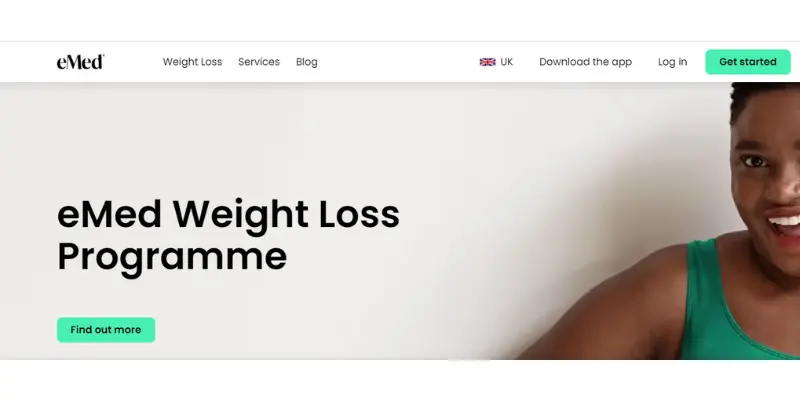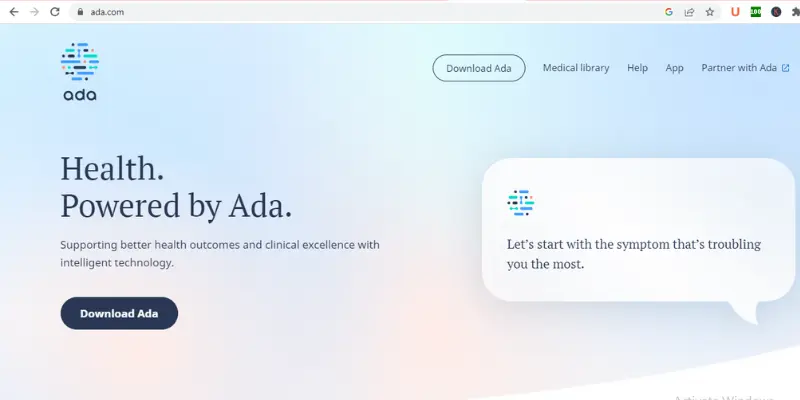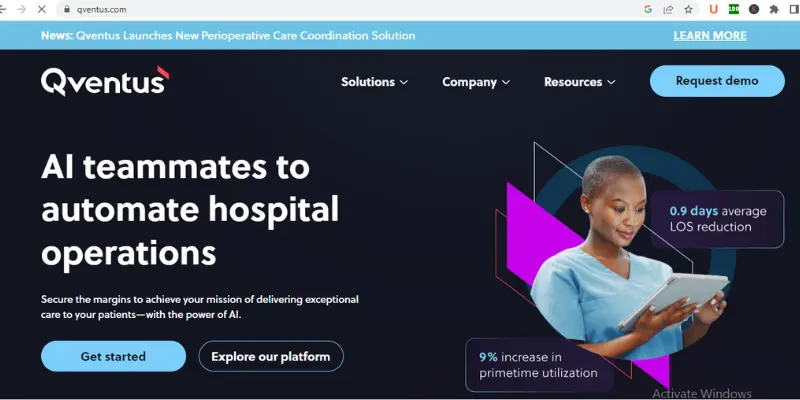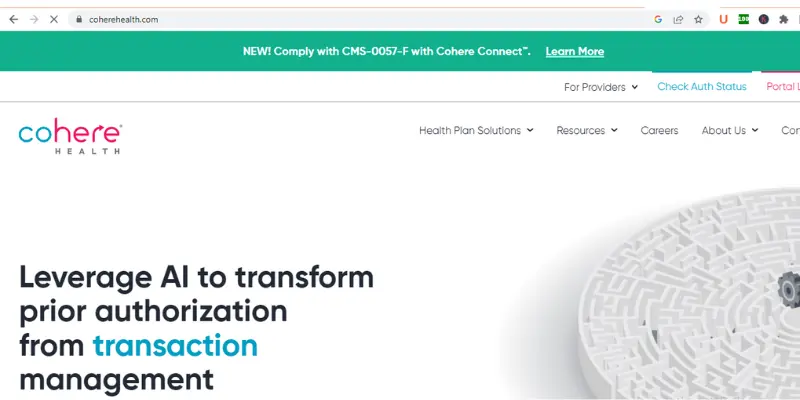Most Famous AI Companies in Patient Engagement
Published: 14 Mar 2025
Why do some patients get instant replies from their healthcare providers while others wait for hours or even days? The answer lies in AI-powered patient engagement solutions. Famous AI companies are introducing automated chat systems, personalized health assistants and real-time medical support that change how patients connect with doctors.
In this article, you will learn about top AI companies that are revolutionizing patient engagement. Together we will discuss how they work, what makes them special and how they are shaping the future of healthcare. Let’s explore!

Why AI in Patient Engagement Matters?
Healthcare can feel frustrating when patients wait too long for responses or struggle to get the right information. AI is solving this problem by making patient engagement faster, easier and more personalized. Here is why AI is becoming a vital component in healthcare:
Better Communication
AI allows doctors and patients to stay connected. Chatbots and virtual assistants answer health questions, remind patients about medications and even schedule follow-ups. This reduces missed appointments and improves care.
24/7 Support
Patients don’t have to wait for office hours. AI tools provide instant help anytime, anywhere. Whether it’s a symptom check or a prescription reminder, AI’s special gadget keeps healthcare accessible.
Personalized Care
AI gives health advice based on patient history and preferences. It suggests lifestyle changes, sends alerts for upcoming checkups and provides recommendations that fit individual needs.
Less Work for Doctors
AI reduces the burden on healthcare providers by handling routine tasks like paperwork, appointment scheduling and answering common medical questions. This allows doctors to focus more on patient care.
Top 6 AI Companies in Patient Engagement
Since AI makes progress in healthcare, every medical field is becoming advanced day by day. With the increase in use of AI in patient engagement a number of AI companies introduce themselves into healthcare for making patient engagement more interactive and engaged.
Here are top 6 AI companies which are revolutionizing patient care.
- Nuance Communications
- Babylon Health
- Ada Health
- Qventus
- Biofourmis
- Cohere Health
Let’s explain each one by one.
1. Nuance Communications (Microsoft)
Nuance Communications, a Microsoft-owned AI company, is changing how doctors and patients communicate with each other. It develops speech recognition and AI-powered tools that help doctors save time on paperwork and focus more on patient care. Its most popular product, Dragon Medical One allows doctors to dictate notes instead of typing, making healthcare easier and more efficient.

How Nuance Uses AI to Improve Doctor-Patient Communication
Nuance Communications is a leading company in AI-powered speech recognition for healthcare. Its technology helps doctors, nurses and healthcare workers to document patient interactions quickly and accurately. Instead of manually typing patient notes, doctors can speak naturally and Nuance’s AI converts their speech into text.
This reduces paperwork and allows healthcare professionals to spend more time with patients instead of filling out records. AI-powered voice recognition also ensures better accuracy, reducing miscommunication and errors in patient care.
Dragon Medical One: A Game Changer for Healthcare Documentation
One of Nuance’s most popular tools is Dragon Medical One. It is an AI-powered voice recognition software designed specifically for healthcare. Doctors use it to:
✅ Dictate medical notes in real-time instead of typing.
✅ Auto-fill patient records in Electronic Health Records (EHR) systems.
✅ Save time on documentation, allowing them to see more patients.
Dragon Medical One understands medical terminologies and adapts to different accents which makes it a reliable tool for doctors worldwide. This AI solution is used in hospitals, clinics and telehealth services to improve patient engagement.
Real-World Impact: Hospitals Using Nuance for Better Efficiency
Many hospitals and healthcare organizations rely on Nuance’s AI to improve their services. For example:
- The developer of Dragon Medical One, claims that their solution enables a 50% reduction in time spent on documentation based on a customer surveys
- The NHS in the UK adopted Nuance’s AI to help reduce administrative burden on doctors.
- Cedars-Sinai Medical Center found that using voice recognition AI improved patient satisfaction because doctors had more time for direct care.
With AI-powered tools like Nuance, healthcare providers can offer faster, more personalized and more efficient patient engagement.
2. Babylon Health
Babylon Health is a UK-based AI company that makes healthcare easier and more accessible through its mobile app. It uses AI-powered tools like a Symptom Checker and virtual doctor consultations to help patients get quick medical advice in the comfort of their home. With partnerships like the NHS in the UK, Babylon is helping millions to access healthcare faster and smarter.

AI-Powered Virtual Consultations: How Babylon Is Changing Telehealth
Babylon Health is a UK-based AI company that is transforming healthcare by making doctor consultations accessible through smartphones. Instead of visiting a clinic, patients can talk to a doctor online using Babylon’s app.
Babylon’s AI helps patients by:
✅ Analyzing symptoms before they see a doctor.
✅ Suggesting possible conditions based on their health history.
✅ Connecting them with real doctors for a video consultation.
This makes healthcare faster and more convenient, especially for people who live in remote areas or have busy schedules. Babylon’s AI reduces unnecessary hospital visits by providing early guidance on health concerns.
Symptom Checker: Helping Patients Make Informed Decisions
One of Babylon’s most popular features is its AI-powered Symptom Checker. Patients can type in their symptoms and Babylon’s AI will:
🔹 Ask follow-up questions to understand the issue better.
🔹 Compare symptoms with medical databases to suggest possible conditions.
🔹 Recommend whether the patient should see a doctor, visit a pharmacy or rest at home.
This tool does not replace doctors but it guides patients on what steps to take next. Many people use it to avoid unnecessary panic and get trusted health advice before booking an appointment.
Suggested article: Pathology AI Companies making an impact in cancer detection
Why the NHS and Global Healthcare Providers Trust Babylon
Babylon Health has partnered with the UK’s National Health Service (NHS) to provide free digital healthcare services to millions of patients. Some hospitals in the US, Canada and Africa also use Babylon’s AI to improve patient engagement.
Real-world impact:
✔ The NHS used Babylon’s AI-powered chatbot to reduce wait times for non-urgent health concerns.
✔ In Rwanda, Babylon’s telemedicine services helped increase healthcare access for people in rural areas.
✔ In the US, Babylon’s partnerships with healthcare providers allowed 24/7 virtual consultations for patients.
Babylon Health is making AI-powered healthcare more accessible and efficient. Its goal is to ensure that every patient, no matter where they are, can get quick medical advice and virtual care when they need it the most.
Also Read: Top 10 Healthcare AI Startups this year.
3. Ada Health
Ada Health is a Berlin-based AI company that helps people understand their symptoms through an easy-to-use AI Symptom Checker. It asks simple questions, analyzes health data and provides personalized insights to guide patients on their next steps. Millions trust Ada to check their symptoms and make better healthcare decisions.

AI Symptom Analysis: How Ada Helps Patients Understand Their Health
Ada Health helps people analyze their symptoms and understand possible health conditions. Its AI-powered Symptom Checker asks patients a series of simple questions about their symptoms, medical history and lifestyle.
Here’s how it works:
✅ The patient enters their symptoms into the Ada app.
✅ The AI asks follow-up questions just like a doctor would.
✅ It compares symptoms with a vast medical database to suggest possible conditions.
✅ It provides recommendations on whether to see a doctor or manage symptoms at home.
This tool is useful for early diagnosis and helps patients make informed decisions about their health before visiting a doctor.
User-Friendly Health Assessments: Making AI Accessible for All
One of Ada’s biggest strengths is its easy-to-use interface. Unlike complex medical websites, Ada’s app feels like chatting with a friendly doctor. It is designed for:
🔹 Everyday users who want a quick health check.
🔹 Parents checking symptoms for their children.
🔹 People with chronic illnesses who need ongoing health monitoring.
Ada Health is available in multiple languages and has been downloaded by millions of users worldwide. It provides accurate and personalized health insights that help patients feel more in control of their health.
Success Stories: How Millions Rely on Ada for Early Diagnosis
Ada Health is trusted by patients, doctors and healthcare organizations. It has been used by over 13 million people and has partnerships with leading healthcare providers.
✅ The UK’s NHS integrated Ada’s AI into its health services to improve patient engagement.
✅ Doctors in Europe and the US recommend Ada as a pre-screening tool before appointments.
✅ Non-profit organizations use Ada’s AI to bring digital healthcare solutions to remote areas.
With its powerful AI and simple interface, Ada Health is making medical knowledge more accessible to everyone. It helps patients understand their symptoms, take action early and make better healthcare decisions.
4. Qventus
Qventus is a US-based AI company that helps hospitals run more efficiently and provide faster care to patients. Its AI predicts patient needs, reduces wait times and speeds up hospital discharges. This results in less waiting, quicker treatments and a smoother healthcare experience for everyone.

AI-Driven Hospital Operations: How Qventus Enhances Patient Experience
Instead of waiting for hours in emergency rooms or dealing with delayed treatments, patients get faster care because Qventus optimizes hospital workflows with AI.
Its AI analyzes hospital data to:
✅ Predict patient needs and help the staff to prepare in advance.
✅ Reduce wait times by improving scheduling and staffing.
✅ Prevent delays in surgeries, discharges and emergency care.
By automating routine tasks and making hospital operations more efficient, Qventus makes sure that patients receive timely care.
Smart Discharge Planning: Helping Patients Leave the Hospital Faster
One of Qventus’ key AI tools is its Smart Discharge Planning system. Many patients experience long hospital stays due to delays in paperwork, approvals or follow-up care. Qventus solves this problem by:
🔹 Tracking each patient’s progress and predicting when they’ll be ready for discharge.
🔹 Alerting hospital staff to prepare discharge paperwork and medications in advance.
🔹 Coordinating follow-up care such as home nursing or rehab to make a smooth transition possible.
This helps patients leave the hospital on time and reduces overcrowding, making room for new patients who need urgent care.
Real-World Success: Hospitals Using Qventus to Improve Care
Many leading hospitals in the US have partnered with Qventus to improve patient engagement and operational efficiency.
✔ OhioHealth saved $1.7 million in a matter of months by implementing Qventus’ AI discharge planning solution.
✔ Lutheran Medical Center in Colorado implemented Qventus’ technology to better coordinate patient discharges, leading to overall reductions in length of stay.
✔ Academic medical centers use Qventus to predict patient surges and adjust staffing in real-time.
By eliminating delays in hospital operations, Qventus makes healthcare faster, smoother and more patient-friendly.
5. Biofourmis
Biofourmis is a US-based AI company that helps in monitoring patients’ health remotely using wearable devices and smart AI. It tracks vital signs, detects health risks early and alerts doctors if something is wrong. This means fewer hospital visits and better care at home.

AI-Powered Remote Patient Monitoring: Keeping Patients Healthy at Home
Biofourmis is famous for helping doctors monitor patients’ health remotely. Instead of waiting for a hospital visit, patients can track their health at home using wearable devices and AI-powered apps.
Here’s how it works:
✅ Patients wear smart sensors that track vital signs like heart rate, temperature and oxygen levels.
✅ Biofourmis’ AI analyzes this data in real time and detects any health risks.
✅ In case of any problems it alerts doctors immediately for early intervention.
This reduces hospital visits, prevents emergencies and helps patients stay healthier.
Personalized Treatment Plans: AI That Adapts to Each Patient
Biofourmis doesn’t just track health symptoms, it also helps doctors create better treatment plans. Its AI studies patient data, lifestyle habits and medical history to provide personalized recommendations.
🔹 Patients with heart disease get customized advice on medication and daily activity.
🔹 Doctors can adjust treatment plans in real time based on AI insights.
🔹 Chronic disease patients receive continuous monitoring without frequent hospital visits.
This ensures that every patient gets care that fits their unique health needs.
Real-World Success: Hospitals and Pharma Companies Using Biofourmis
Biofourmis is trusted by hospitals, pharmaceutical companies and healthcare providers to improve patient care.
✔ Major hospitals in the US use Biofourmis AI to monitor post-surgery patients and prevent complications.
✔ Pharma companies use its AI to track how patients respond to new medications.
✔ Healthcare organizations worldwide rely on Biofourmis for chronic disease management.
By combining wearable tech and AI, Biofourmis makes remote healthcare more effective for patients everywhere.
6. Cohere Health
Cohere Health is a US-based AI company that helps patients get faster approvals for medical treatments and procedures. Its AI speeds up insurance approvals, reduces paperwork and improves communication between doctors and insurers. This means less waiting and quicker access to the care patients need.

AI-Powered Prior Authorization: Making Healthcare Approvals Faster
Cohere Health helps patients get medical approvals faster. Many people wait days or weeks for insurance companies to approve tests, treatments or surgeries. Cohere Health solves this problem by using AI to speed up the prior authorization process.
Here’s how it works:
✅ Doctors submit requests for treatments or procedures.
✅ Cohere’s AI reviews the request and checks medical guidelines.
✅ It gives instant approvals for most cases, reducing long delays.
✅ If needed, doctors can speak to specialists for faster decisions.
This removes unnecessary paperwork and helps patients get the care they need without long waits.
Patient-Centered Care Coordination: Connecting Doctors, Insurers, and Patients
Cohere Health bridges the gap between healthcare providers, insurance companies and patients. It ensures that everyone stays informed and care plans move forward without delays.
🔹 Doctors get real-time updates on approvals.
🔹 Patients receive clear information on their treatment plans.
🔹 Insurance companies can process requests faster using AI-powered automation.
This reduces confusion, speeds up treatments and improves patient engagement.
Success Stories: How Cohere Health is Transforming Medical Approvals
Many healthcare organizations and insurance companies use Cohere Health to improve the prior authorization process.
✔ A major US health insurer reduced approval wait times from days to minutes using Cohere’s AI.
✔ Hospitals using Cohere AI saw a 30% decrease in treatment delays.
✔ Doctors reported fewer administrative burdens, allowing them to focus more on patient care.
By automating approvals and improving communication, Cohere Health ensures that patients get the right treatment at the right time–without unnecessary delays.
How These Companies Are Changing Patient Engagement
AI is transforming how patients interact with healthcare. From faster responses to personalized treatment, these AI-Aided companies are making patient care smoother, more efficient, cheaper and accessible. Let’s explore the key ways AI is changing patient engagement.
Better Patient Experience
Many patients struggle with long wait times, confusing medical advice and difficulty scheduling appointments. AI solves these problems by offering:
✔ Instant virtual assistance through chatbots and AI-powered apps.
✔ Faster access to doctors via telehealth platforms.
✔ Easy-to-understand health assessments with AI symptom checkers.
For example, Babylon Health’s AI chatbot for patient engagement allows patients to assess symptoms and book virtual appointments quickly without waiting.
Cost Reduction
Medical costs are rising and unnecessary hospital visits add to the financial burden. AI cuts down the costs by reducing the need for in-person visits and streamlining administrative tasks.
🔹 Cohere Health’s AI assistant answers medical questions, helping patients decide if they need a doctor.
🔹 Qventus AI optimizes hospital workflows, reducing delays and cutting operational costs.
This saves money for both patients and hospitals while improving overall efficiency.
Improved Efficiency
Doctors often face heavy workloads which lead to longer response times and potential delays in care.
AI-powered tools reduce this burden by:
✅ Automating documentation with AI voice recognition (e.g., Nuance’s Dragon Medical One).
✅ Speeding up patient sort out with AI-driven symptom checkers (e.g., Ada Health’s AI app).
✅ Predicting patient needs to prevent hospital overcrowding (e.g., Qventus AI).
This means doctors can focus on patient care instead of paperwork. This leads to quicker treatments and better healthcare outcomes.
More Personalized Care
As every patient has unique genetics, thus AI helps in creating customized healthcare plans based on individual medical history and health patterns.
📌 Biofourmis’ AI-powered remote monitoring tracks patients’ vital signs in real-time and alert the doctors about early health risks.
📌 Cohere Health’s AI ensures faster treatment approvals, so patients don’t have to wait weeks for their insurance to process requests.
With AI, healthcare is no longer one-size-fits-all because now patients get treatment plans suited to their specific needs.
Final Thoughts
AI-powered companies are revolutionizing patient engagement by making healthcare smarter and more accessible. Whether it’s helping doctors manage workloads, cutting costs or providing round-the-clock support, AI is reshaping how patients receive care.
Want to stay updated on the latest AI healthcare trends? Keep following Techie Visions for more insights!
Challenges and Future of AI in Patient Engagement
AI is transforming healthcare, but it also leads to certain challenges. While it improves patient engagement, some concerns need attention. Let’s look at the key AI challenges and what the future holds for AI in patient care.
Challenges of AI in Patient Engagement
AI in patient engagement face challenges like;
Privacy Concerns: How Safe is Patient Data?
AI in healthcare relies on massive amounts of patient data. This raises concerns about data security, privacy and misuse.
- Patients worry about how their medical records are stored and shared.
- Companies must follow strict regulations like HIPAA (USA) and GDPR (Europe) to protect patient data.
- Cybersecurity threats could expose sensitive health information if not properly managed.
AI Accuracy & Reliability: Can AI Always Be Trusted?
AI tools help in diagnosing symptoms and provide health advice but they’re not 100% accurate.
- AI models can misinterpret symptoms, leading to wrong recommendations.
- Bias in AI training data may cause errors in diagnosis, especially for underrepresented groups.
- Doctors still need to verify AI-driven decisions before prescribing treatments.
Integration Issues: AI Adoption in Hospitals is Slow
Hospitals already use electronic health records (EHRs), scheduling systems and patient portals. Adding AI to existing systems isn’t always smooth.
- AI platforms must integrate with current hospital software, which takes time.
- Doctors and nurses need training to use AI-powered tools effectively.
- Some healthcare providers resist AI adoption due to lack of trust or high implementation costs.
Future Trends: What’s Next for AI in Patient Engagement?
Future of AI is looking very bright and shine under the shade of cutting edge technologies.
AI-Driven Mental Health Support
I can not say AI will enter into your brain but, we can expect that more AI chatbots and virtual assistants will be developed and highly trained to support mental health.
- AI-powered therapy bots like Wysa and Woebot help patients manage anxiety and depression.
- AI can analyze speech patterns and messages to detect early signs of mental distress.
Predictive Analytics: AI Detecting Health Risks Early
AI will become better at predicting diseases before symptoms appear.
- AI can analyze a patient’s health history and predict risks for diabetes, heart disease or cancer.
- Predictive AI will help doctors take preventive action, reducing hospital visits.
Voice AI Assistants for Elderly Care
AI-powered voice assistants are improving healthcare for elderly patients.
- AI can remind seniors to take their medication at the right time.
- Voice-controlled devices help those with limited mobility access healthcare services.
- AI can alert caregivers or emergency services if it detects unusual behavior.
Also read our detailed article on AI companies in radiology.
Conclusion
Hey Guy’s! We discussed the Role of AI in patient engagement and explored the top 6 AI companies making progress in this field. Companies like Nuance, Babylon Health, and Ada Health are leading the way by improving communication, reducing wait times and offering 24/7 support. However, challenges like privacy concerns, AI accuracy and system integration must be addressed to unlock AI’s full potential in healthcare.
The future of AI in patient engagement is bright with advancements in predictive analytics, mental health support and voice AI assistants. As AI continues to develop, it will redefine how patients interact with healthcare providers—making care more proactive and patient-centered.
🚀 Now is the time to explore AI’s impact on patient engagement! Whether you’re a healthcare professional or a tech enthusiast, staying informed about these AI-driven companies will help you understand the future of digital healthcare. Keep learning, keep exploring—because the next big healthcare breakthrough might just be powered by AI! 💡
Related Queries
After exploring how AI companies are revolutionizing patient engagement, you might have some questions. Here are frequently asked questions with concise, beginner-friendly answers:
Patient engagement refers to the collaboration between patients and healthcare providers to improve health outcomes. It involves patients actively participating in their own care, making informed decisions and maintaining open communication with their medical teams.
AI enhances patient engagement by providing personalized health information, 24/7 support through chatbots and predictive analytics to anticipate patient needs. These technologies facilitate timely interventions and empower patients to manage their health more effectively.
No, AI cannot replace human doctors. Instead, it serves as a supportive tool, assisting healthcare professionals by automating routine tasks, analyzing large datasets and providing insights thereby allowing doctors to focus more on direct patient care.
Yes, privacy is a significant concern. AI systems require access to sensitive patient data, necessitating robust security measures and compliance with regulations like HIPAA to ensure confidentiality and prevent unauthorized access.
AI can analyze vast amounts of data quickly and identify patterns that might be missed by humans. However, while AI can assist in diagnostics, it is not perfect. It should be used as a supportive tool not a replacement for the clinical judgment of healthcare professionals.
Examples include AI-powered chatbots that answer patient queries and virtual health assistants that provide medication reminders and predictive analytics tools that identify patients at risk of certain conditions and enable proactive care.
AI chatbots provide immediate responses to patient inquiries, offer symptom assessments, schedule appointments and deliver medication reminders, thereby enhancing accessibility and convenience in patient care.
Yes, potential risks include data breaches, misdiagnoses due to algorithm bias and the possibility of patients misinterpreting AI-generated information without proper medical guidance.
Hospitals integrate AI by implementing EHR systems, adopting AI-driven diagnostic tools and utilizing AI for administrative tasks like scheduling and billing to streamline operations and improve patient care.
The future of AI in patient engagement includes more personalized medicine, predictive health analytics and enhanced virtual care platforms. There is a sign of improved patient outcomes and more efficient healthcare delivery in the future healthcare AI.





